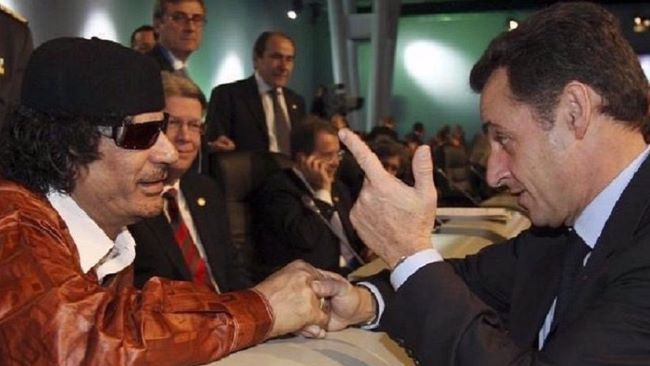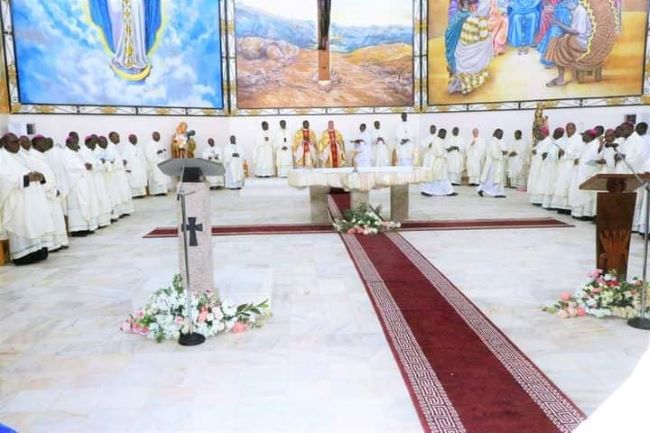5, January 2025
France: Former president Sarkozy faces court over alleged €50 million Gaddafi pact 0
Former French president Nicolas Sarkozy, already convicted twice in separate cases since leaving office, on Monday goes on trial charged with accepting illegal campaign financing in an alleged pact with the late Libyan dictator Muammar Gaddafi.
The career of Sarkozy has been shadowed by legal troubles since he lost the 2012 presidential election. But he remains an influential figure for many on the right and is also known to regularly meet President Emmanuel Macron.
The fiercely ambitious and energetic politician, 69, who is married to the model and singer Carla Bruni and while in power from 2007-2012 liked to be known as the “hyper-president”, has been convicted in two cases, charged in another and is being investigated in connection with two more.
Sarkozy will be in the dock at the Paris court barely half a month after France’s top appeals court on December 18 rejected his appeal against a one year prison sentence for influence peddling, which he is to serve by wearing an electronic bracelet rather than in jail.
The latest trial is the result of a decade of investigations into accusations that Sarkozy accepted illegal campaign financing – reportedly amounting to some 50 million euros – from Gaddafi to help his victorious 2007 election campaign.
In exchange, it is alleged, Sarkozy and senior figures pledged to help Gaddafi rehabilitate his international image after Tripoli was blamed for bombing attacks on Pan Am Flight 103 in 1988 over Lockerbie in Scotland and UTA Flight 772 in 1989 that killed hundreds of passengers.
Sarkozy has denounced the accusations as part of a conspiracy against him, insisting that he never received any financing for the campaign from Gaddafi and that there is no evidence of any such transfer.
‘He will fight’
At a time when many Western countries were courting Gaddafi for energy deals as the maverick dictator sought to emerge from decades of international isolation, the Libyan leader in December 2007 visited Paris, famously installing his tent in the centre of the city.
But France then backed the UN-sanctioned military action that helped in 2011 oust Gaddafi, who was then killed by rebels. Sarkozy has said allegations from former members of Gaddafi’s inner circle over the alleged campaign financing are motivated by revenge.
If convicted, Sarkozy faces up to 10 years in prison under the charges of concealing embezzlement of public funds and illegal campaign financing. The trial is due to last until April 10.
Sarkozy “is awaiting these four months of hearings with determination. He will fight the artificial construction dreamed up by the prosecution. There was no Libyan financing of the campaign,” said his lawyer Christophe Ingrain.
Among 12 others facing trial over the alleged Libyan financing are heavyweights such as Sarkozy’s former right-hand man, Claude Gueant, his then-head of campaign financing, Eric Woerth, and former minister Brice Hortefeux.
“Claude Gueant will demonstrate that after more than ten years of investigation, none of the offences he is accused of have been proven,” said his lawyer Philippe Bouchez El Ghozi, denouncing the cases as amounting to “assertions, hypotheses and other approximations.”
Witness tampering charges
For the prosecution, the pact started in 2005 when Gaddafi and Sarkozy, then interior minister, met in Tripoli for a meeting ostensibly devoted to fighting illegal migration. But Sarkozy’s defence counters that no trace of the illegal financing was ever found in the campaign coffers.
The scandal erupted in April 2012, while Sarkozy was in the throes of his re-election campaign, when the Mediapart website published a bombshell article based on a document purportedly from December 2006 it said showed a former Libyan official evoking an agreement over the campaign financing.
Sarkozy has long contended that the document is not genuine.
An embittered Sarkozy would later narrowly lose the second round of the election to Socialist François Hollande.
Franco-Lebanese businessman Ziad Takieddine, a key figure in the case, had claimed several times that he helped deliver up to five million euros ($5.4 million at current rates) in cash from Gaddafi to Sarkozy and his chief of staff in 2006 and 2007.
But in 2020, Takieddine suddenly retracted his incriminating statement, raising suspicions that Sarkozy and close allies may have paid the witness to change his mind.
In a further twist, Sarkozy was charged in October 2023 with illegal witness tampering while Carla Bruni was last year charged with hiding evidence in the same case.
Sarkozy’s second conviction, in another campaign financing case, was confirmed last year by a Paris appeals court which ruled he should serve six months in prison, with another six months suspended. This verdict can still go to a higher domestic appeals court.
Source: AFP


























6, January 2025
Biya regime removes VAT on locally produced flours 0
Locally produced flours made from corn, yam, cassava, and plantain are now exempt from Value Added Tax (VAT). This new policy, outlined in the 2025 finance law and confirmed by the General Directorate of Taxes (DGI), is expected to lower the price of these products on the market by 19.25%, which matches the current VAT rate in the country.
The government sees this move as part of its strategy to promote “import substitution.” By encouraging the production of local flours, Cameroon aims to reduce its reliance on imported wheat, one of the country’s most imported food products, alongside rice. This dependency has heavily contributed to the country’s trade deficit.
In 2023, although imports dropped by 31.6% compared to the previous year, Cameroon still spent CFA178.3 billion on wheat imports, down from CFA260.7 billion in 2022. France remains the top supplier of wheat to Cameroon, followed by Poland, Russia, and Germany. Notably, Poland saw a 9% increase in wheat exports to Cameroon in 2023.
To lessen the country’s dependence on imported wheat, particularly for bread production—which is one of the most widely consumed foods in Cameroon—the government has been promoting local flours in recent years. Before removing VAT on these products, the government had already modified bread production standards, allowing up to 15% of local starch-based flours, such as cassava and yam, to be blended with wheat flour. The long-term goal is to gradually replace wheat flour with local flours in bread-making.
In 2023, the Ministry of Youth launched a training program for trainers in local flour processing, with the aim of teaching at least 378 young Cameroonians to make pastries using locally produced flours. In line with these efforts, a platform for local producers was established in 2022, with a target of producing around 5 million tons of high-quality products by 2030. However, this target seems ambitious, given the current pace of local flour production.
In his national address on December 31, 2024, President Paul Biya announced that 12,800 tons of local flours were produced in Cameroon in 2024. In comparison, the country imported 887,400 tons of wheat in 2023, according to the National Institute of Statistics (INS).
Achieving the goal of producing 5 million tons within five years will require significant investments, especially from millers whose factories are mainly designed to process wheat. As Alfred Momo Ebongue, Secretary General of the Cameroon Millers’ Industry Group (GIMC), pointed out, mills will need to be redesigned or adapted to process local tubers like cassava, yam, and potatoes instead of just wheat.
Source: Business in Cameroon